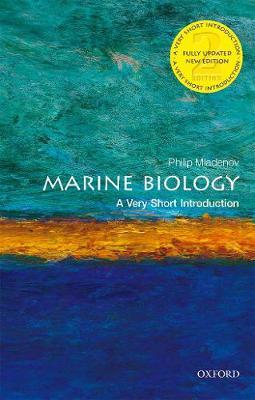Marine Biology: A Very Short Introduction

Marine Biology: A Very Short Introduction
profound changes. The study of marine biology is thus taking on added importance and urgency as people struggle to understand and manage these changes to protect our marine ecosystems. Healthy oceans produce half of the oxygen we breathe; stabilize our climate; create ecosystems that protect our
coasts from storms; provide us with abundant food; and host diverse organisms that provide us with natural products for medicine and biotechnology.
In this Very Short Introduction, marine biologist Philip Mladenov provides an accessible and up-to-date overview of marine biology, offering a tour of marine life and marine processes that ranges from the unimaginably abundant microscopic organisms that drive the oceans' food web to the apex predators that we exploit for food; from polar ocean ecosystems to tropical coral reefs; and from the luxurious kelp beds of the coastal ocean to deep-ocean hydrothermal vents where life exists
without the energy of the sun. Throughout the book he considers the human impacts on marine life including overfishing, plastic and nutrient pollution, the spread of exotic species, and ocean warming and acidification. He discusses the threats these pose to our welfare, and the actions required to put us on a
path to a more sustainable relationship with our oceans so that they can be restored and protected for future generations. Mladenov concludes with a new chapter offering an inspiring vision for the future of our oceans in 2050 that can be realised if we are wise enough to accelerate actions already underway and be bold with implementing new approaches.
The next decade will decide the state of the oceans that we leave behind for future generations.
ABOUT THE SERIES:
The Very Short Introductio
PRP: 74.08 Lei
Acesta este Pretul Recomandat de Producator. Pretul de vanzare al produsului este afisat mai jos.
66.67Lei
66.67Lei
74.08 LeiLivrare in 2-4 saptamani
Descrierea produsului
profound changes. The study of marine biology is thus taking on added importance and urgency as people struggle to understand and manage these changes to protect our marine ecosystems. Healthy oceans produce half of the oxygen we breathe; stabilize our climate; create ecosystems that protect our
coasts from storms; provide us with abundant food; and host diverse organisms that provide us with natural products for medicine and biotechnology.
In this Very Short Introduction, marine biologist Philip Mladenov provides an accessible and up-to-date overview of marine biology, offering a tour of marine life and marine processes that ranges from the unimaginably abundant microscopic organisms that drive the oceans' food web to the apex predators that we exploit for food; from polar ocean ecosystems to tropical coral reefs; and from the luxurious kelp beds of the coastal ocean to deep-ocean hydrothermal vents where life exists
without the energy of the sun. Throughout the book he considers the human impacts on marine life including overfishing, plastic and nutrient pollution, the spread of exotic species, and ocean warming and acidification. He discusses the threats these pose to our welfare, and the actions required to put us on a
path to a more sustainable relationship with our oceans so that they can be restored and protected for future generations. Mladenov concludes with a new chapter offering an inspiring vision for the future of our oceans in 2050 that can be realised if we are wise enough to accelerate actions already underway and be bold with implementing new approaches.
The next decade will decide the state of the oceans that we leave behind for future generations.
ABOUT THE SERIES:
The Very Short Introductio
Detaliile produsului








